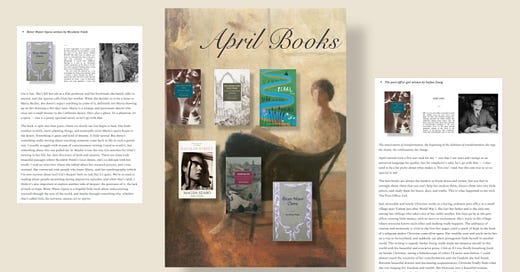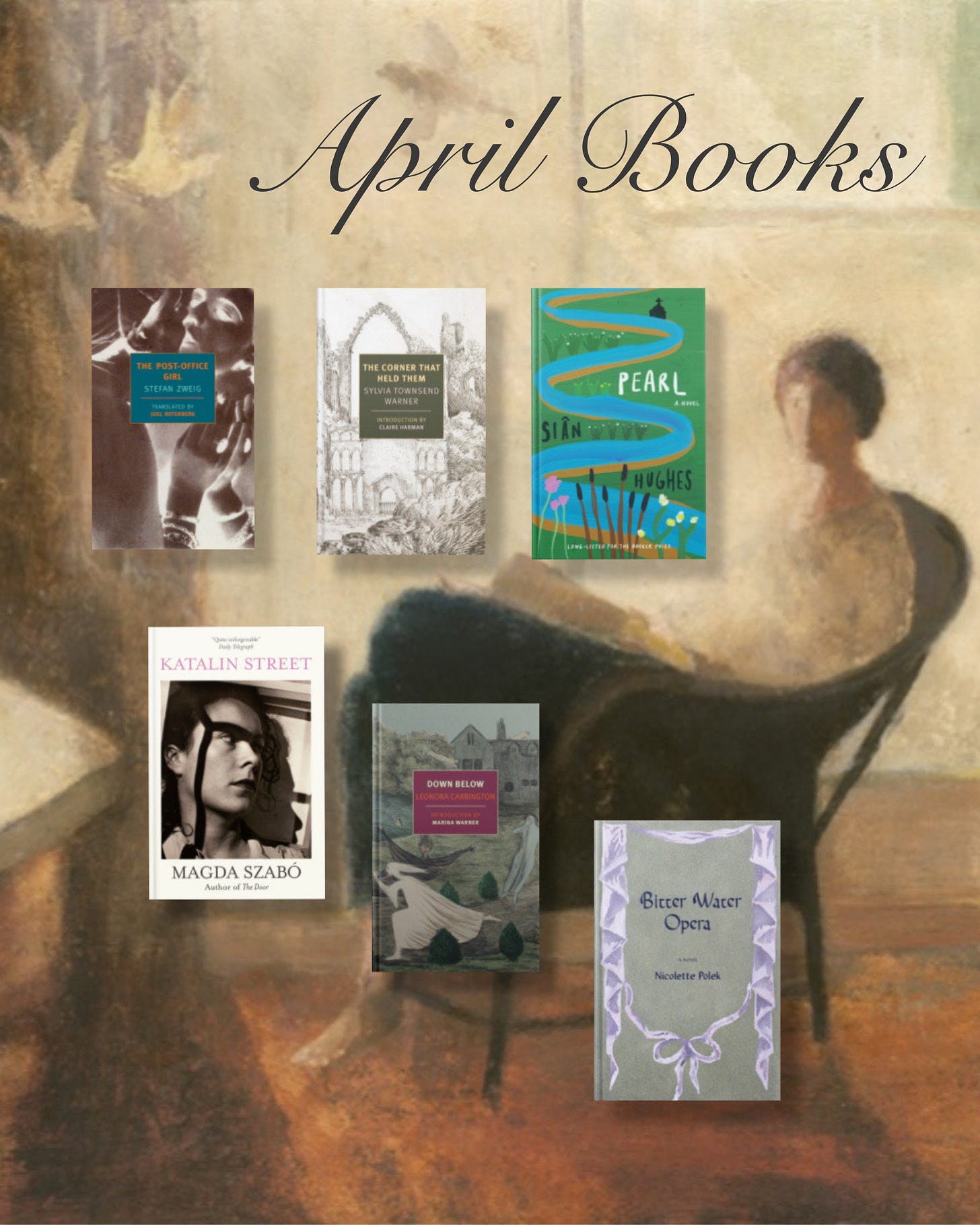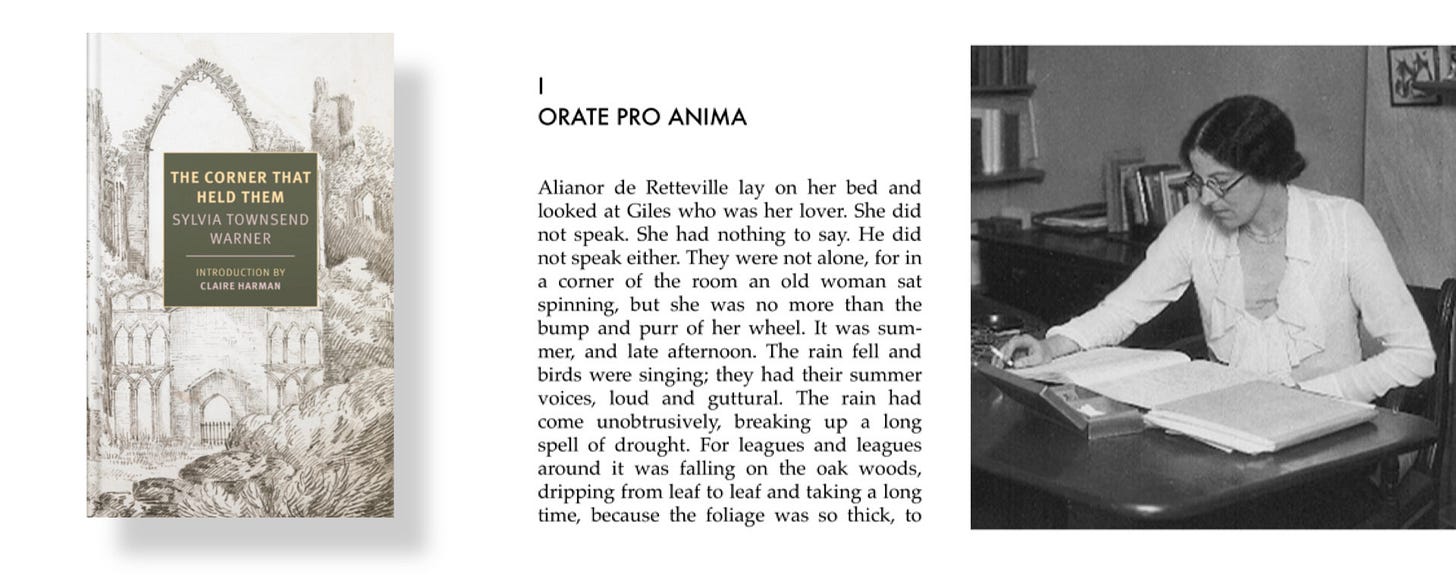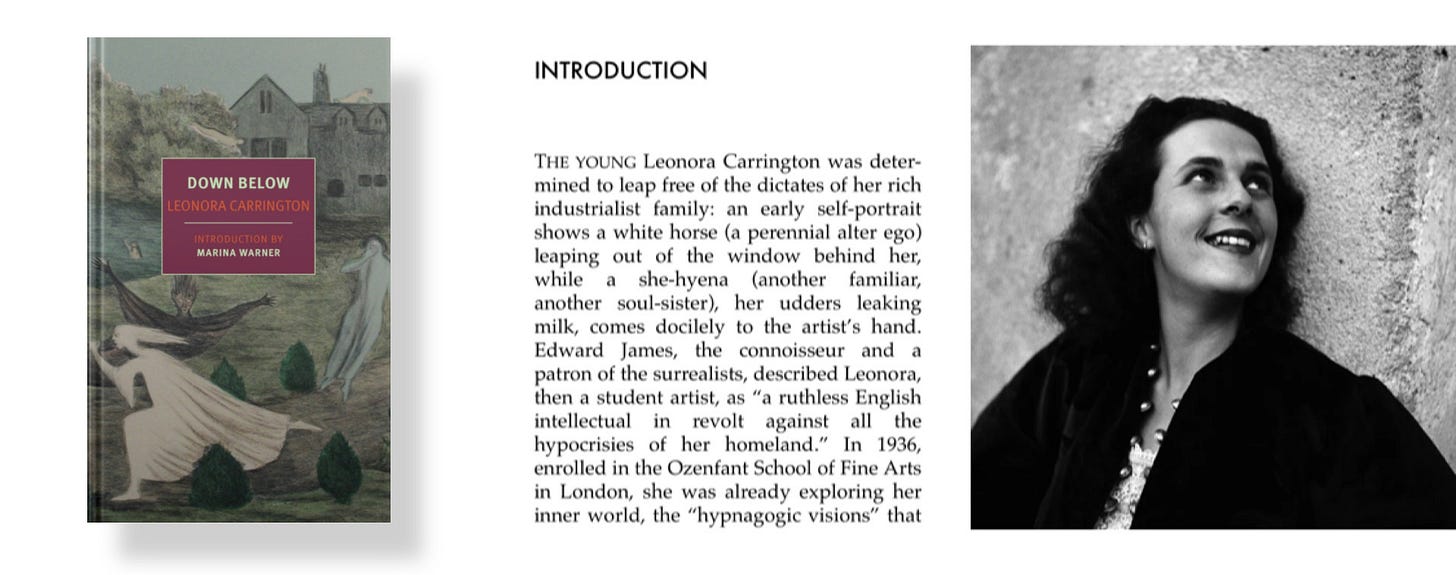Into the Archivist’s Mind: April Books
Thoughts and reflections about the six books I read in April!
April was a very good month, one of the most special, actually! I found a new forever favorite book and if you follow me on Instagram, you may have already seen my 800 word review about it. I do apologize for the length, but it’s so rare for me to find a nearly perfect book — I just had to share all my thoughts. I read so many beautiful books this month, some even more beautiful than others (though there was a little letdown, you’ll see what I mean at the end)
This year has been going so well so far, and I’m excited to see what May will bring!
As always, thank you for reading!
— Ella.
The post-office girl written by Stefan Zweig.
The intoxication of transformation, the beginning of the delirium of transformation, the rage, the shame, the exhilaration, the change.
April started with a five star read for me — not that I see stars and ratings as an universal language for quality, but for simplicity's sake, let's go with that — I also tend to be a bit picky about what makes a "five star" read, but this one was so so so special to me! The best books are always the hardest to break down and review, but you feel so strongly about them that you can’t help but analyze them, dissect them into tiny little pieces, and study them for hours, days, and weeks. This is what happened to me with The Post-Office Girl.
Sad, miserable and lonely Christine works at a boring, ordinary post office in a small village near Vienna just after World War I. She lost her father and is the only one among her siblings who takes care of her sickly mother. Her days go by at the post office, earning little money, with no news or excitement. She’s stuck in this village where everyone knows each other and nothing really happens. The ambiance of routine and monotony is vivid in the first few pages, until a spark of hope in the form of a telegram makes Christine come alive again. Her wealthy aunt and uncle invite her on a trip to Switzerland, and suddenly our plain protagonist finds herself in another world. The writing is superb, Stefan Zweig really made me immerse myself in this world with his beautiful and evocative prose. I felt as if I was finally breathing fresh air beside Christine, seeing a kaleidoscope of colors I’d never seen before. I could almost touch the intensity of her transformation and the freedom she had found. Between beautiful dresses and fascinating acquaintances, Christine finally finds what she was longing for: freedom and wealth. She blossoms into a beautiful woman, undergoing a rapid and sudden metamorphosis, but without realizing that soon her aunt will grow tired of her. Just as she changed her world, it will be transformed once more, and she'll be returned to her old reality. The spectrum of her emotions eventually leads to one of the most powerful: anger. Her fury is directed at everyone and everything, just like the fury of a stranger who suddenly bursts into her life: Ferdinand, a war veteran. I felt a deep connection with the hatred Ferdinand felt toward the government. Depression and poverty are what connect these two lost souls, and this connection will ultimately lead to something drastic.
I’ve read that the structure and fragmentation of the novel sometimes annoy readers, and that the story feels like two separate books. Stefan Zweig actually wrote this slowly, finishing it after many years, and the book was published posthumously after his suicide. I do agree that it can feel like two separate stories, but I didn’t mind that at all. I think it adds to the overall narrative: we transition from a bleak and depressed place to a wonderland of life and then back to a miserable state of mind. I found this realistic, and it made me sympathize with Christine even more. The question of “Who am I?” lingers throughout the entire novel. And it made me wonder: am I the same person regardless of my environment, or do I shift depending on who surrounds me? Am I simply a mirror, reflecting those in front of me? Do I change myself to fit in, or has this always been who I truly am? Is this metamorphosis real or am I just coming out of my shell and finally allowing myself to be the person I’ve always been? I have so much to say about Christine. She’s complex, and her desire to live made her feel so real. She’s so many different people, oscillating between her dark, depressed moments and bursts of aliveness and vibrancy. During the few weeks that change her life, she asks herself: Why? Why are they interested in me? Was I always interesting, or am I only loved here, in this dazzling and rich world? The people back home never really got me. After experiencing what her life could have been, she will never be the same. The idea of returning to an ordinary existence, after having felt truly special, is something that destroys her. Over time, she begins to question how wealth and a life of ease shape a person's character. Christine became one of my favorite characters ever. I also loved the ending (usually, I’m not fond of open endings) it was perfect. The questions of “Where are they now? How did it end?” will linger with me forever.
Katalin Street written by Magda Szabó.
This is my second Szabó! I started my journey with Abigail, which I liked but didn’t love, and I now feel the same way about Katalin Street. Let me explain. We have the loss of youth, love with all its consequences and complications, war, family, and the ghosts that haunt the narrative — all centered around three families and basically four strong characters who live on the same street in prewar Budapest. The children grow up together, and inevitably, Balint, the only boy in this little group, will have to choose someone to marry. We know from the start that he chooses Irén, who narrates large parts of the novel. Blanka, her sister, is so different from her. And Henriette, the last to join the circle, suffers the harshest fate. The whole novel essentially revolves around their relationships: intense and intimate, full of love, friendship, jealousy, and betrayal. It would be easy to call this book a romance, but that would also be lazy and wouldn’t give Szabó the credit she deserves. I’m not a snob, but I don’t particularly enjoy reading books that are only about relationships. I can appreciate a love story when it’s exceptionally well written, and when it’s not the only thing the book is trying to do. Here, while love is undeniably central, it’s never sloppy. Beyond the beautifully rendered prewar and postwar setting (which Szabó captures masterfully) the true strength of the novel lies in its characters. Irén, especially, I found so interesting and complex, often contradictory. Her relationship with Blanka was tender and strong. I always love reading about sibling love. We have Balint, and as always, like the majority of male characters involved in a love triangle, I couldn’t stand him. At one point, halfway through the book, I struggled to keep going because I just couldn’t understand why every woman loved him, or why Irén kept going back to him. And what to say about Henriette? My favorite of the four. Her point of view was delicate and heartbreaking, a fragile soul who didn’t deserve what life handed her. The last chapter still haunts me, she’s a character I’ll be thinking about for a long time. Aside from my personal taste in love triangles, Magda Szabó doesn’t let you blink, if you do, you miss something. That’s why I think we all need to become slow readers. Her writing makes you want to slow down and inhale every word. I’ll leave you with my favorite passage from the whole book:
“They had resigned themselves to the prospect of increasing difficulties with digestion and sleeping, things they had taken for granted when young, like life itself. But no-one had told them that the most frightening thing of all about the loss of youth is not what is taken away but what is granted in exchange. Not wisdom. Not serenity. Not sound judgement, or tranquillity. Only the awareness of universal disintegration.”
The Corner That Held Them written by Sylvia Townsend Warner.
A quintessential tale about the passage of time, The Corner That Held Them takes us through life in Oby, a medieval convent, from its founding in 1349 through 1382. We live inside these walls with a large cast of characters and Marxist principles. Warner herself claimed that Marxism was an inspiration for all the financial troubles the convent faces throughout the years. She also acknowledged that the book doesn’t really have a plot or a protagonist, and yet she still considered it her favorite among the ones she wrote. I have to admit, the lack of a strong protagonist put me off. I often felt like I was reading about the same people over and over again, just with different names. That said, I don’t mind exploring the everyday life of people, especially medieval nuns, a reality so different from mine. I only wish the prose had been a bit more engaging. Something about it didn’t quite convince me. I felt the same way about Lolly Willowes; perhaps I’m more drawn to her interesting plots and ideas than to their actual execution? I picked this up because I read that it was an inspiration for Matrix by Lauren Groff (which I’m planning to read soon!), and I wanted to be prepared. I was genuinely interested and intrigued by the setting, which was enchanting. I think the atmosphere is what saved the book for me as it actually reminded me a lot of one of my favorite games ever: Pentiment. It had its bright sides, but I wouldn’t recommend it to everyone. It can feel heavy at times, and you really need to be invested in the lives of these millions of characters. But yes, if you’ve played Pentiment, I know you’ll enjoy it.
Bitter Water Opera written by Nicolette Polek.
Gia is lost. She’s left her job as a film professor and her boyfriend, she barely talks to anyone, and she ignores calls from her mother. When she decides to write a letter to Marta Becket, she doesn’t expect anything to come of it, definitely not Marta showing up on her doorstep a few days later. Marta is a strange and passionate dancer who once ran a small theater in the California desert. She’s also a ghost. Or a phantom. Or a spirit — this is a pretty spiritual novel, so let’s go with that. The book is split into four parts, where we slowly see Gia begin to heal. She finds comfort in faith, starts planting things, and eventually visits Marta’s opera house in the desert. Everything is quiet and kind of dreamy. A little surreal. But there’s something really moving about watching someone come back to life in such a gentle way. I usually struggle with stream of consciousness writing, I tend to avoid it, but something about this one pulled me in. Maybe it was the way Gia searches for what’s missing in her life, her slow discovery of faith and serenity. There are some truly beautiful passages where Nicolette Polek’s voice shines, she’s so delicate with her words. I read an interview where she talked about her research process, and I was stunned. She connected with people who knew Marta, read her autobiography (which I’m now curious about too!) Gia’s despair feels so real, but it’s quiet. We’re so used to reading about people unraveling during depressive episodes, and while that’s valid, I think it’s also important to explore another side of despair: the quietness of it, the lack of faith or hope. Bitter Water Opera is a hopeful little book about rediscovering yourself through the eyes of the world, and maybe through something else, whether that’s called God, the universe, nature, art or spirits.
Down Below written by Leonora Carrington.
Leonora Carrington was far from an ordinary woman, and that is clear from her surreal and enchanting paintings. After reading this short memoir, I’m even more certain of it. Her life was tragic — there's simply no other word for it. Though she never considered herself a victim or spoke of herself as a martyr, I couldn’t help but feel deeply sorry for her. When her boyfriend was sent to a concentration camp, she fell into madness, and this memoir is the haunting account of that dark period. Her life was marked by unimaginable suffering, from sexual violence to psychological torment, institutionalization, and constant mental instability. It’s a lot to process, and it’s not easy for me to talk about, as it is deeply personal. Commenting on her story almost feels wrong, but I want to share my thoughts. I decided to read Down Below because I was already familiar with Carrington’s art and had planned to read The Hearing Trumpet, her only novel. Since I heard it was a little eccentric, I thought reading her memoir might offer a glimpse into how her mind worked. She certainly had an entire universe within her, sometimes I thought she was so detached from all of it that it almost felt as if she was retelling someone else’s story. I think her mental illness was something that never truly left her. The majority of her time in the institution was spent inside her own head, disconnected from the outside world. What happened to her against her will was both unforgivable and horrifying. This is a heavy read. I’d recommend it for anyone interested in this eccentric woman, but it’s best read in small doses, slowly, while always remembering her incredible brave spirit.
Pearl written by Siân Hughes.
This book was one of the biggest letdowns ever for me. I’d been wanting to read it for years, pretty much since it came out in 2023. When I finally found it second hand (sorry, but sometimes books are just so expensive), I was over the moon! But that’s where it gets tricky. As always, I read the blurb and was so intrigued. The story basically revolves around Marianne, who loses her mother when she’s eight years old, and the mystery behind that disappearance. The description also mentions secrets, a haunting poem (which gives the novel its title), and an overall atmosphere of folklore. But the blurb is written in a way that makes you think you’ll follow Marianne from childhood to adulthood, struggling with the mystery and the loss of her mother… That’s not the case, unfortunately. When we meet the protagonist, she’s already grown and has a daughter, and the whole novel is simply her memories: of her mother, and of her other relationships. Now, I’ve fallen victim to these kinds of “fake blurbs” so many times, but you never really get used to it. I know it’s not a huge deal, but for some reason it just annoyed me so much. Mixed with the general boredom of it all, and writing that wasn’t that exceptional, it just became a drag. Even though the portrayal of grief was done really well, Marianne didn’t stand out to me. The mystery of her mother’s disappearance stopped being interesting pretty early on. It took me four days to get through a book that’s barely 200 pages! I think the last fifteen-ish pages were okay, but that’s about it. Very disappointing, but I think this was just a case of personal preference. I’m sure it’ll find the right audience!










